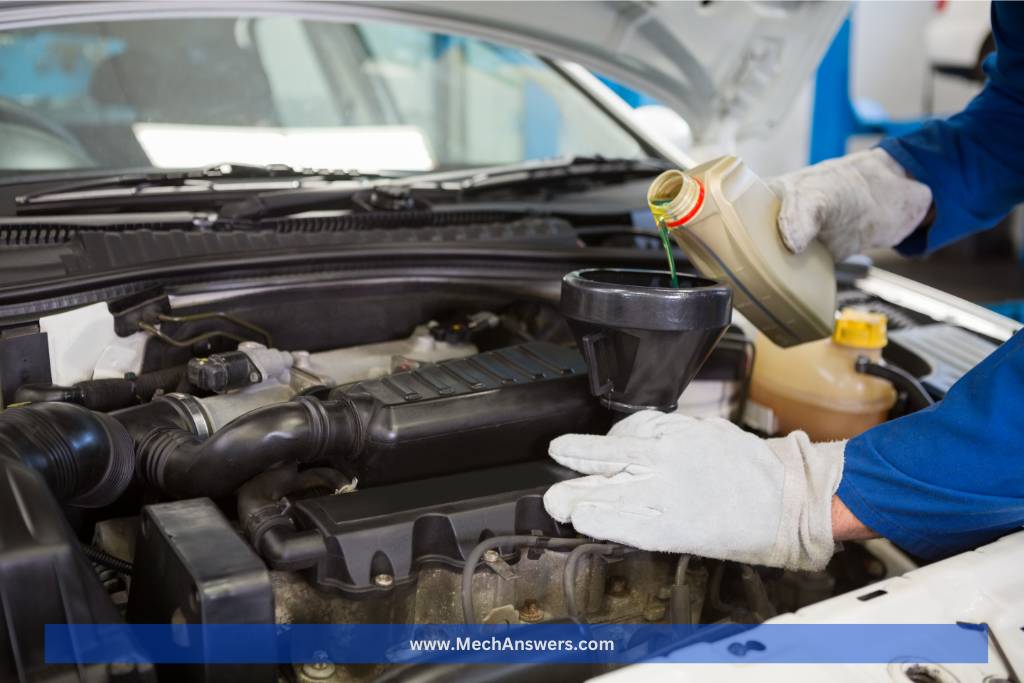You may ask yourself, perhaps even searching for “Can I Use 10W40 Instead Of 5W30?”, haven’t you? Well, search no more. This article sets out to analyze these two types of oil, their compatibility, and potential implications for your engine.
So, can you use 10W40 instead of 5W30? While they may seem similar, they have different viscosities, and using 10W40 instead of 5W30 could potentially harm your engine over time. Although in some cases and climates, this switch might not cause immediate damage, it may affect the engine’s performance, fuel economy, and lifespan.
By reading this article, you’ll gain a better understanding of engine oils, their specifications, and how making the right choice can significantly influence your vehicle’s longevity and performance.
Table of Contents
Understanding Motor Oil Viscosity
Motor oils are crucial for the health and performance of an engine. Among the myriad of available oil grades, 10W40 and 5W30 are two of the more common options.
While both serve to lubricate and cool the engine, there are crucial differences between them. Understanding these differences is vital for anyone wanting to make the best choice for their vehicle.
Viscosity Ratings
The most fundamental difference between 10W40 and 5W30 is their viscosity ratings. Viscosity, simply put, is a liquid’s resistance to flow. Motor oils with lower viscosity ratings flow more easily than those with higher ratings.
For both 10W40 and 5W30, the numbers before the “W” (which stands for winter) represent the oil’s viscosity at cold temperatures. The numbers following the “W” indicate viscosity at higher temperatures, specifically at 100°C.
5W30:
This oil has a viscosity of 5 when cold and 30 when warm. It’s a multi-grade oil that’s designed to perform well in a variety of conditions, but especially in cold temperatures.
10W40:
Here, the oil has a viscosity rating of 10 when cold and 40 when warm. This means it’s a bit thicker in both cold and warm conditions compared to 5W30.
Cold Weather Performance
Given that 5W30 has a lower viscosity when cold, it’s more suited to colder climates than 10W40. It will flow more easily during cold starts, ensuring that the engine components are adequately lubricated. This reduces the risk of engine wear and extends the engine’s life.
High-Temperature Stability
On the other hand, 10W40, with its higher warm viscosity, offers better protection at higher temperatures. It’s less likely to break down in hot conditions, making it suitable for vehicles operating in warmer climates or under severe driving conditions.
Fuel Efficiency
Thinner oils generally provide better fuel efficiency. So, with its thinner consistency, especially when the engine is warm, 5W30 can offer slightly better fuel efficiency compared to 10W40.
Engine Wear and Tear
For engines that have seen significant wear and tear, the thicker 10W40 might be more appropriate. It can better fill gaps and spaces that have formed in worn engines, ensuring proper lubrication and potentially reducing oil consumption.
Final Thoughts
While both 10W40 and 5W30 are versatile and can function in a variety of environments, the choice between them often boils down to specific vehicle requirements and external conditions.
Always refer to the vehicle’s owner’s manual to get a clear understanding of the recommended oil type and remember that using the wrong oil can compromise engine performance and longevity.
Comparison Between 5W30 and 10W40 Motor Oils
| Property | 5W30 | 10W40 |
|---|---|---|
| Cold Start Viscosity | Lower | Higher |
| High Temp. Viscosity | Lower | Higher |
| Fuel Efficiency | Better | Lower |
| Engine Wear | Balanced | Protective |
| Temperature Control | Better | Lower |

Can You Use 10W40 Instead of 5W30?
Can I use 10W40 instead of 5W30?
Navigating the world of motor oils can be daunting, especially when faced with a question like, “Can I use 10W40 instead of 5W30?” The simple answer is yes, in some cases, you can. However, it’s essential to understand the implications, benefits, and potential risks involved.
Considering Engine Specifications
Vehicle manufacturers recommend specific oil viscosities based on the engine’s design and function. Switching from the recommended oil grade can impact the engine’s performance.
While 10W40 may offer better high-temperature stability due to its thicker nature, it may not be optimal for engines designed for 5W30, especially in colder climates.
Potential Risks
There are several concerns when switching motor oils. Using 10W40 in an engine designed for 5W30 can lead to:
Delayed engine start:
The thicker 10W40 might not flow as quickly as 5W30, especially during colder conditions. This can prolong engine start time.
Reduced fuel efficiency:
Thicker oils can create more resistance in the engine, leading to decreased fuel economy.
Potential engine damage:
In the long run, consistently using a thicker oil can lead to premature engine wear and potential damage.
The Need for Adaptability
In some scenarios, it might make sense to use 10W40. If you’re in a consistently hotter climate or have an older engine with significant wear, 10W40’s thickness might offer better protection and reduced oil consumption. However, always consult with a mechanic or refer to the vehicle’s manual before making such a decision.
Conclusion
While it is technically possible to use 10W40 instead of 5W30, it’s essential to be aware of the potential consequences and benefits. Always prioritize the health of your engine and refer to the manufacturer’s guidelines. When in doubt, seek expert advice before making any decisions about motor oil substitutions.

When Using 10W40 Might Be Acceptable or Even Beneficial
The debate surrounding the use of 10W40 in place of 5W30 is ongoing among car enthusiasts and mechanics.
While sticking to the manufacturer’s recommendation is always the safest bet, there are instances where using 10W40 could prove to be beneficial or even necessary.
Consistent High-Temperature Climates
In areas with notably high temperatures, engines can run hotter than usual. Under these conditions, a thicker oil like 10W40 can maintain its protective viscosity better than a thinner oil, ensuring the engine remains well-lubricated and safeguarded against wear.
Older Engines with Wear
As engines age, they might develop small leaks or burn off oil more quickly. In older engines with noticeable wear, 10W40 can offer better sealing capabilities and reduce oil consumption. This thicker oil might fill gaps more effectively, keeping the engine running smoothly for longer periods.
Heavy Towing and Loads
For vehicles frequently subjected to heavy towing or carrying significant loads, the added stress can generate more heat in the engine. In these situations, a thicker oil can provide that extra layer of protection against the increased wear and tear.
In Conclusion
While 5W30 remains the recommended oil for many modern vehicles, there are certain scenarios where 10W40 could be acceptable or even advantageous.
However, always consult with a trusted mechanic or the vehicle’s manual before making the switch to ensure the engine’s longevity and optimal performance.
Benefits and Disadvantages of 10W40 Motor Oil
Benefits of 10W40
1. Excellent Performance in Hotter Climates
10W40 motor oil is known for its reliable performance under consistently high temperatures. In regions that frequently experience hotter weather, this oil retains its viscosity better, providing stable protection for engines.
2. Suitable for Older Engines
Engines with a significant number of miles or those that have seen better days may benefit from 10W40. This oil offers better sealing properties, potentially reducing oil consumption and improving performance in worn engines.
3. Enhanced Protection during Heavy Towing
For vehicles that frequently tow heavy loads or are put under consistent heavy-duty use, 10W40 oil can provide an added layer of protection against the intensified wear and tear.
Disadvantages of 10W40
1. Not Ideal for Cold Start-ups
In colder climates or during winter months, 10W40 can be thicker at startup, making engines work harder during ignition. This can lead to increased engine wear over time.
2. Fuel Efficiency Concerns
Due to its thicker consistency, vehicles using 10W40 might experience slightly reduced fuel efficiency compared to thinner motor oils.
Benefits and Disadvantages of 5W30 Motor Oil
Benefits of 5W30
1. Versatility in Various Climates
5W30 motor oil boasts of a broad performance range, making it suitable for use in both cold and warm climates. Its ability to remain fluid at lower temperatures ensures swift engine startups during cold mornings.
2. Fuel Efficiency
Being a slightly thinner oil when compared to 10W40, 5W30 can improve fuel economy as it allows for smoother engine operations and less resistance.
3. Recommended for Many Modern Vehicles
Most modern car manufacturers recommend 5W30 oil for their engines, which means it’s designed to cater to the latest engine technologies and specifications.
Disadvantages of 5W30
1. Might Not Be Ideal for Older Engines
Older engines, or those with significant wear, might experience increased oil consumption when using 5W30 due to its thinner consistency.
2. Reduced Protection in Extreme Heat
In consistently high-temperature regions or under extreme heavy-duty operations, 5W30 might lose its protective properties faster than thicker oils like 10W40.
In conclusion, while both oils have their place, it’s essential to choose based on the vehicle’s age, the prevalent climate, and the type of use the vehicle is subjected to. Always refer to the manufacturer’s guidelines when selecting an oil grade.
What Happens if You Put 10W Oil Instead of 5W?
Understanding Viscosity Ratings:
Motor oil viscosity is graded by two numbers. The first number followed by the letter “W” represents the oil’s flow at cold temperatures. So when you opt for 10W instead of 5W, the oil is thicker when cold. This property directly affects an engine’s startup, especially in colder climates.
Immediate Implications:
Using 10W oil instead of 5W means the oil won’t circulate as freely at startup during cold conditions. This can lead to increased engine wear during the initial moments after ignition.
Engines rely on oil’s swift circulation to lubricate moving parts; a delay can cause these parts to grind against each other, leading to premature wear.
Long-Term Consequences:
Consistent use of a thicker oil during colder temperatures can gradually affect engine health. Over time, this could mean reduced engine efficiency, increased fuel consumption, and a shorter overall engine lifespan.
What Cars Can Use 10W40 Oil?
Older Vehicles:
Many older vehicles were designed when multi-viscosity oils weren’t as advanced as they are now. 10W40 oil, due to its thickness, provides better sealing capabilities suitable for these vehicles that might burn through thinner oils.
Vehicles in Hot Climates:
Temperature plays a pivotal role in oil performance. In regions with consistently high temperatures, the viscosity of 10W40 offers reliable engine protection. It resists thinning out too much in heat, ensuring that the engine remains well-lubricated.
Heavy-Duty Tasks:
Engines subjected to strenuous tasks, like towing, consistently carrying heavy loads, or frequent uphill drives, experience more stress. The robust nature of 10W40 can provide the added protection these engines require.
What Cars Can Use 5W30 Oil?
Modern Engineering:
The majority of new-generation vehicles are engineered for multi-viscosity oils such as 5W30. This oil strikes a balance between performance, protection, and fuel efficiency, making it a go-to for many manufacturers.
Adaptable Performance:
5W30’s range is versatile. It performs admirably across varied temperatures, proving its worth in regions that experience both chilling winters and scorching summers. Its ability to flow quickly in cold while maintaining a protective consistency in heat is a testament to its adaptability.
Environmental Considerations:
5W30 is often highlighted for its environmental benefits. It promotes better fuel efficiency, leading to reduced carbon emissions. Moreover, its widespread acceptance means recycling and disposal processes are better streamlined.
Is 10W40 Good for High Mileage?
The Nature of Older Engines:
Engines with higher mileage often have worn parts and might not be as tightly sealed as they were when new. This can result in oil leaks or burn-offs in some cases. The slightly thicker nature of 10W40 can be advantageous in sealing gaps better than thinner oils.
Preventing Oil Burn-off:
High mileage engines, due to their wear and tear, might consume oil faster. 10W40 oil, being on the thicker side, reduces the rate at which this burn-off occurs, ensuring that the engine remains lubricated for longer periods between oil changes.
Wear and Tear Considerations:
A thicker oil like 10W40 can provide a protective cushioning between engine parts, helping to reduce the rate of wear. This can be especially helpful in prolonging the life of older engines.
Is 5W or 10W Better for Summer or Winter?
Temperature and Viscosity Dynamics:
The first number in an oil’s grade, whether 5W or 10W, indicates the oil’s viscosity at cold temperatures. The lower the number, the thinner the oil. Thinner oil circulates more efficiently in cold, making 5W more suited for winter.
Conversely, the second number (like 30 or 40) indicates the oil’s viscosity at hot temperatures. A higher number like 40 means the oil will be thicker in heat, potentially making 10W40 more appropriate for hot summer months.
Cold Starts in Winter:
5W oil flows better in colder temperatures. Using it in winter ensures the engine gets lubrication quickly during cold starts, reducing engine wear that can happen if the oil doesn’t circulate quickly.
Operating in Summer:
While both oils can operate in summer, 10W oils might be slightly thicker during the initial start in warmer temperatures, but this difference is minimal.
The second number becomes more significant: 40 indicates the oil will be more resistant to thinning in the heat, which might be preferable in extremely hot conditions.
Is it Safe to Mix 10W40 and 5W30 Motor Oils?
Short-Term Solution:
In emergencies, mixing different grades of motor oils isn’t likely to cause immediate damage. However, the mixture won’t provide the optimal performance or protection that each oil is designed to deliver when used separately.
Compromised Performance:
While not inherently damaging, the mixed oils won’t provide the exact properties of either 5W30 or 10W40. This means the engine might not be as well-protected against wear, or it might not perform as efficiently.
Manufacturer Recommendations:
It’s always crucial to follow the manufacturer’s recommendation for oil type. Regularly mixing oils might void warranties or lead to longer-term issues that arise from sub-optimal lubrication.
Is it Necessary to Flush the Engine if I Switch from 5W30 to 10W40 Motor Oil?
Benefits of Flushing:
Flushing the engine can help remove any residual old oil and contaminants. When switching between significantly different oil types, this ensures that you’re not mixing them, even inadvertently.
Potential Risks of Not Flushing:
While not flushing might not lead to immediate damage, over time, the residues of the old oil might affect the performance of the new one. This can lead to decreased efficiency or a slightly increased rate of wear.
Final Verdict:
While it might not be strictly necessary to flush the engine, doing so is a best practice to ensure optimal engine performance and longevity when switching oil types.
Related Articles
Read more >> 5W20 vs 5W30: A Detailed Comparison With Pros And Cons
Read more >> 10W30 vs 10W40: A Detailed Comparison with Pros and Cons!
Read more >> Can I Use 5W30 Instead of 5W20? Safety & Consequences
Read more >> Can I Use 10W30 Instead of 5W30? Safety & Consequences
Read more >> Can I Use 10W40 Instead Of 10W30? Safety & Consequences
Read more >> Can Low Oil Cause Overheating? 12 Causes & Solutions
Read more >> Why Does My Dipstick Shows No Oil After Oil Change? (Facts!)
Read more >> Can The Wrong Oil Cause Overheating? Simply Explained
Conclusion
The question of whether you can use 10W40 instead of 5W30 depends on various factors, such as vehicle manufacturer recommendations, driving conditions, and climate.
While it may be acceptable or even beneficial to use 10W40 in certain situations, it is crucial to follow the manufacturer’s guidelines to ensure optimal engine performance, protection, and longevity.
Before making the switch to a different motor oil viscosity, consider the potential safety and performance implications, as well as any possible warranty issues. Always consult your vehicle’s owner’s manual or the manufacturer for the recommended motor oil viscosity and maintenance procedures.
In cases where you are unsure about the best motor oil viscosity for your specific needs, seek professional advice from a trusted mechanic. Remember, the key to maintaining your vehicle’s engine health and performance is to use the appropriate motor oil viscosity and adhere to recommended maintenance schedules.
Reference Source:
https://bobistheoilguy.com/forums/threads/10w-40-instead-of-5w-30-okay-mechanic-says.71120/

